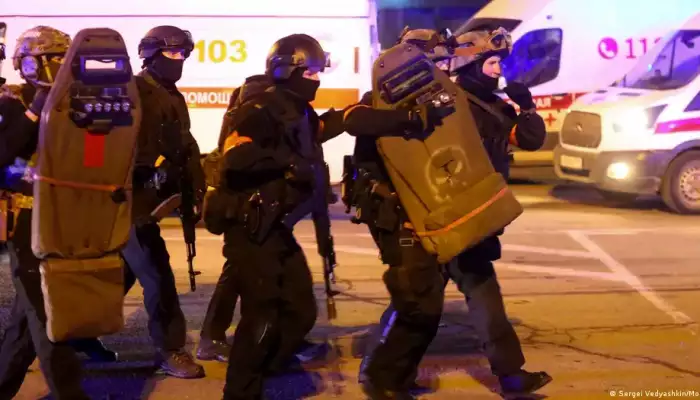
VERTISEMENT
Intelligence agencies are secretive, gathering information to bolster national security or help their governments make political decisions.
To do so, they sometimes even spy on allies. The National Security Agency (NSA) in the United States, for example, spied on German Chancellor Angela Merkel's phone for several years — a fact the US would have preferred had never come to light.
It took the American media only a few days to cite the phrase “duty to warn,” today arguably three of the most revered words in the intelligence community’s lexicon. When invoked, they require specific information about an imminent terrorist attack to be forwarded to vulnerable and threatened nations, including Russia and Ukraine. The US duty-to-warn obligation even extends to other potential adversaries such as Iran, with that government having a similar obligation to warn all. The requirement doesn’t include operations run by either nation.
This American intelligence community passed a warning of a possible attack involving religious extremists from Pakistan, Tajikistan, and Uzbekistan eighteen days in advance of the Moscow concert hall assault that killed at least 137 people and injured more than one hundred. Such a warning invariably comes from intercepts from the National Security Agency and agent reports from the Central Intelligence Agency.
The Americans did their job but the Russian intelligence community, heeding its boss, did not. President Vladimir Putin publicly called the warning “provocative statements” three days before the attack, and the Russian security services ignored it.
They bear responsibility, in the view of American intelligence experts, for failing to do what was necessary to protect the concertgoers.In other situations, intelligence agencies are more open to sharing what they know. On February 23, 2022, for example — the eve of the war in Ukraine — the United States informed Germany and other European allies of intelligence it had about Russia's imminent invasion.
A few weeks ago, the US even shared intelligence with Russia — hardly an ally — warning of a potential terror attack in Moscow in the coming days.
On March 7, the US Embassy in Moscow warned US citizens in Russia that "extremists have imminent plans to target large gatherings in Moscow, to include concerts," and advised Americans to "avoid large gatherings over the next 48 hours."
Though the suspected attackers did not strike for another 15 days, the warning was nevertheless prescient — Friday's attack targeted a Moscow concert venue, Crocus City Hall, and left at least 139 people dead.
After news of the attack broke, White House National Security Council spokesperson Adrienne Watson referred to the US Embassy warning, saying, "The US government also shared this information with Russian authorities in accordance with its longstanding 'duty to warn' policy."
Further details, such as those related to this intelligence's source, remain unknown.
Two senior Russian intelligence officials later alleged they had information showing the involvement of Ukrainian, US or British involvement at some level in the attack.
Did Russia ignore US warnings?
Asked how seriously Russia had taken the US warnings, Peter Neumann, a terrorism researcher at King's College London, said not seriously enough. Neumann pointed out that Russian President Vladimir Putin dismissed the warnings as propaganda.
"He basically said this [warning] was some kind of psychological warfare operation designed by the US to throw him off, and he didn't take it seriously at all," Neumann told German public broadcaster Deutschlandfunk.
Although the United States is not a party to the war in Ukraine, it considers Russia a threat to its security — Putin regularly levels public threats against the US.
"I assume the US made this [terror] warning public because it probably stopped cooperating with Russian intelligence agencies," said Michael Götschenberg, a terrorism expert at German public broadcaster ARD.
"Nations always warn each other about imminent or planned terrorist attacks via their intelligence agencies when they learn about them," Götschenberg told DW. "This used to be the case with Russian intelligence agencies as well, yet I assume cooperation has ended due to the fact that Russia is waging a war against Ukraine."
Terrorist groups such as IS) offshoot ISIS-K, operate internationally, as recent attacks in Russia, Iran and Afghanistan show. Ensuring public safety makes it imperative that national intelligence agencies cooperate.
"Western intelligence agencies consistently share information with each other, tips are passed on and processed by the respective investigating authorities," Götschenberg told DW. "These tips often turn out to be nothing, but officials do investigate and arrest suspects when they find something."
Is intelligence sharing common?
US intelligence agencies share information based on the "duty to warn" principle stipulated in the 1947 National Security Act and a 1981 decree issued by then-US President Ronald Reagan. Terrorism expert Götschenberg told DW that intelligence sharing has intensified since the 1980s.
The terror attacks of September 11, 2001, played a major role in galvanizing attitudes on intelligence sharing, said Götschenberg, noting that the attacks sparked agreement that important information should never again be withheld. He added that the principle still stands today.
"Over the past two years, we repeatedly faced situations where IS supporters were suspected of planning attacks, and we successfully thwarted them." Suspected ISIS-K followers scouted out several potential terror targets in Germany, among them Colone Cathedral, a popular tourist attraction, and a folk festival. A week ago, German investigators arrested two ISIS-K sympathizers suspected of planning an attack on the Swedish Parliament.
Speaking to Deutschlandfunk, terrorism researcher Peter Neumann said the European law enforcement agency Europol found that attempted terror attacks had spiked since the October 7 terror attacks on Israel by the militant, Islamist, Palestinian group Hamas. The European Union as well as the United States, Germany and several other countries classify Hamas as a terrorist organization.
"Thank God nothing has happened [in Europe]," he said, "but the attempts are becoming more frequent. Sometimes its just a question of luck."